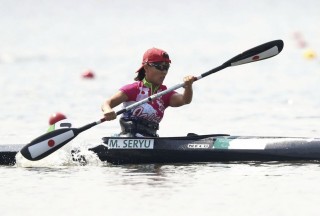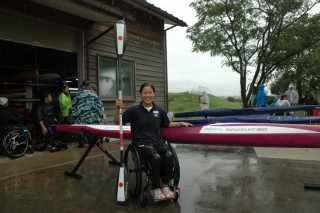Loading
Search
▼ Eyes on Tokyo 2020 / Seryu rides Wave Toward Rio Redemption
- Category:Event
Just about 1½ years after she started para-canoeing, Monika Seryu reached the grand setting athletes dream of, making her Paralympic debut in 2016 at 18. However, her experience at the Rio de Janeiro Games ended in humiliation.
Seryu advanced to the women’s final of the 200-meter KL1 category in Rio, but she finished last among eight finalists in 1 minute 9.193 seconds, about 10 seconds behind the gold medalist.
“Initially, I was somewhat satisfied with the fact that I made the Paralympics,” Seryu said during an interview with The Japan News. “However, when I got back to Japan, feelings of shame, regret and anger hit me.
“The world-class canoeists were totally different. I lacked experience, skill, physical strength, stamina — everything. I did my best at the time, but in retrospect, I wasn’t an athlete. I was just a lucky girl.”
Now 20, she is seeking redemption at the 2020 Tokyo Paralympics, aiming to win a medal there. Reflecting this ambition, her attitude in training has changed. She has increased the time she spends on fundamental training, working hard with weights to gain strength, for example, as well as exercising to boost her stamina. As for canoe skills, she has worked on improving her paddling to improve the efficiency of each stroke.
Seryu has confidence in the sharpness of her starts. “I think I’m No. 1 in the world in the first 75 meters. What I have to work on is how to keep the pace in the latter portion of the race,” she said.
She finished eighth at the World Cup in May this year, but broke the 1-minute range for the first time, finishing in 59.959 seconds. She slimmed her margin behind the winner to 3.8 seconds.
Seryu advanced to the women’s final of the 200-meter KL1 category in Rio, but she finished last among eight finalists in 1 minute 9.193 seconds, about 10 seconds behind the gold medalist.
“Initially, I was somewhat satisfied with the fact that I made the Paralympics,” Seryu said during an interview with The Japan News. “However, when I got back to Japan, feelings of shame, regret and anger hit me.
“The world-class canoeists were totally different. I lacked experience, skill, physical strength, stamina — everything. I did my best at the time, but in retrospect, I wasn’t an athlete. I was just a lucky girl.”
Now 20, she is seeking redemption at the 2020 Tokyo Paralympics, aiming to win a medal there. Reflecting this ambition, her attitude in training has changed. She has increased the time she spends on fundamental training, working hard with weights to gain strength, for example, as well as exercising to boost her stamina. As for canoe skills, she has worked on improving her paddling to improve the efficiency of each stroke.
Seryu has confidence in the sharpness of her starts. “I think I’m No. 1 in the world in the first 75 meters. What I have to work on is how to keep the pace in the latter portion of the race,” she said.
She finished eighth at the World Cup in May this year, but broke the 1-minute range for the first time, finishing in 59.959 seconds. She slimmed her margin behind the winner to 3.8 seconds.
Seryu was in Komatsu, Ishikawa Prefecture, in September to take part in the national championships, but her event was canceled because of strong winds. She agonized over this because she had sufficient training during the summer, and was confident of finishing in the low 58-second range.
“There’s still a distance from the top group, but now I feel I can compete on the same field as them,” Seryu said.
Hometown battle
Seryu is driven by another factor — the canoe sprint events at the 2020 Games will take place in her home area of Koto Ward, Tokyo.
“The amazing atmosphere I experienced at the Rio Games will be re-created in my hometown — I still can’t believe it’s true,” she said.
Koto Ward is located between two major rivers, the Sumidagawa and the Arakawa, and many small rivers and water channels run through the area. Residents enjoy canoeing events and competitions.
Seryu started canoeing in her second year in junior high school. She improved steadily, aiming to reach the National Athletics Meet in 2013. However, in her first year of high school, she fell during a physical education class, suffering a disastrous blow to her head and back.
She was diagnosed with trunk impairment, and her life in a wheelchair began.
As she was struggling to adapt, she was invited to resume canoeing by an official of Koto Ward’s canoeing association whom she knew well.
“My reaction was: ‘What on earth are you talking about? I can’t ride in a boat,’” Seryu recalled. “At the time, I was doing everything I could to keep up at school.”
However, the official did not give up. One day, Seryu visited a canoe venue to officially decline the offer. But when she placed herself in a canoe, she was struck by the feeling, “I can do it.”
With the experience in canoeing she already had, Seryu progressed rapidly, taking part in the national championships in September 2014 and earning a berth to the Rio Games at the world championships in May 2016.
‘We don’t need pity’
Seryu said the appeal of canoeing is that people can enjoy the sport regardless of their age, sex and disability. “It’s barrier-free on water,” Seryu said.
“Once you’re in a boat, you can’t distinguish who uses a wheelchair or who doesn’t have legs — disabilities don’t matter on water.”
After she began to use a wheelchair, Seryu was initially frustrated by the fact that other people looked down on her, but “in canoeing, you can compete with non-disabled people with your eyes on the same level.”
Seryu said she was able to open up because of the sport. “After I started canoeing again, I had to leave my home, I had to take trains — canoeing became a bridge that connected me to society.”
Seryu has another, non-medal goal to achieve in her hometown during the Tokyo Paralympics: “I want to show that disabled people don’t need pity. I want to show that we can do so many different things.”
“There’s still a distance from the top group, but now I feel I can compete on the same field as them,” Seryu said.
Hometown battle
Seryu is driven by another factor — the canoe sprint events at the 2020 Games will take place in her home area of Koto Ward, Tokyo.
“The amazing atmosphere I experienced at the Rio Games will be re-created in my hometown — I still can’t believe it’s true,” she said.
Koto Ward is located between two major rivers, the Sumidagawa and the Arakawa, and many small rivers and water channels run through the area. Residents enjoy canoeing events and competitions.
Seryu started canoeing in her second year in junior high school. She improved steadily, aiming to reach the National Athletics Meet in 2013. However, in her first year of high school, she fell during a physical education class, suffering a disastrous blow to her head and back.
She was diagnosed with trunk impairment, and her life in a wheelchair began.
As she was struggling to adapt, she was invited to resume canoeing by an official of Koto Ward’s canoeing association whom she knew well.
“My reaction was: ‘What on earth are you talking about? I can’t ride in a boat,’” Seryu recalled. “At the time, I was doing everything I could to keep up at school.”
However, the official did not give up. One day, Seryu visited a canoe venue to officially decline the offer. But when she placed herself in a canoe, she was struck by the feeling, “I can do it.”
With the experience in canoeing she already had, Seryu progressed rapidly, taking part in the national championships in September 2014 and earning a berth to the Rio Games at the world championships in May 2016.
‘We don’t need pity’
Seryu said the appeal of canoeing is that people can enjoy the sport regardless of their age, sex and disability. “It’s barrier-free on water,” Seryu said.
“Once you’re in a boat, you can’t distinguish who uses a wheelchair or who doesn’t have legs — disabilities don’t matter on water.”
After she began to use a wheelchair, Seryu was initially frustrated by the fact that other people looked down on her, but “in canoeing, you can compete with non-disabled people with your eyes on the same level.”
Seryu said she was able to open up because of the sport. “After I started canoeing again, I had to leave my home, I had to take trains — canoeing became a bridge that connected me to society.”
Seryu has another, non-medal goal to achieve in her hometown during the Tokyo Paralympics: “I want to show that disabled people don’t need pity. I want to show that we can do so many different things.”
- October 31, 2018
- Comment (0)
- Trackback(0)



